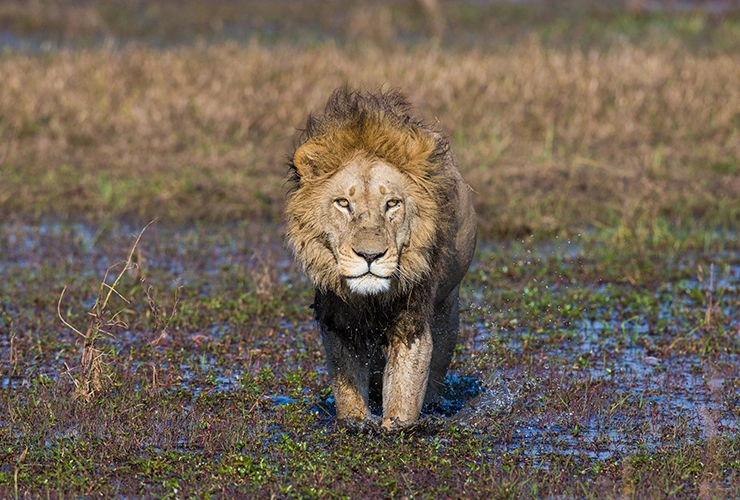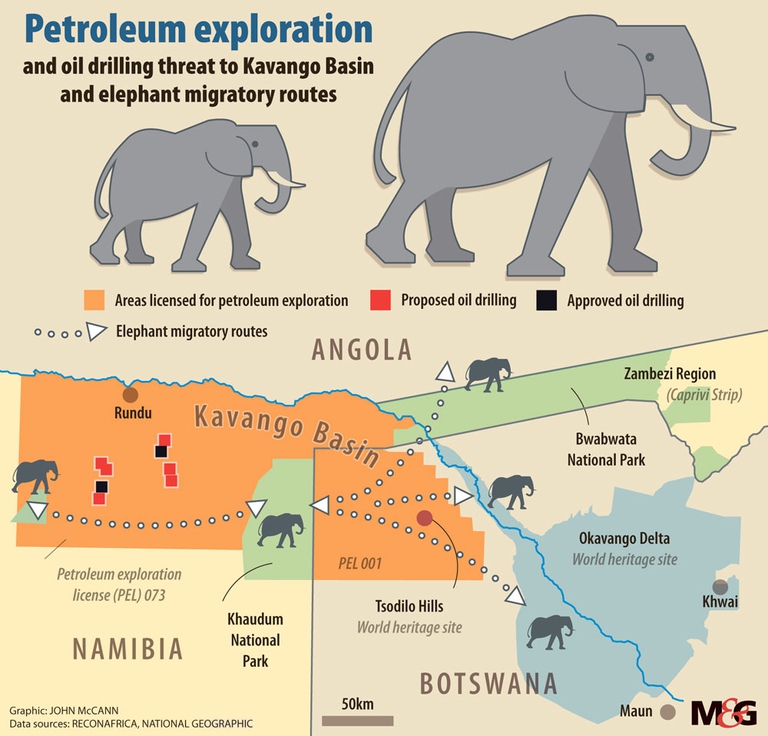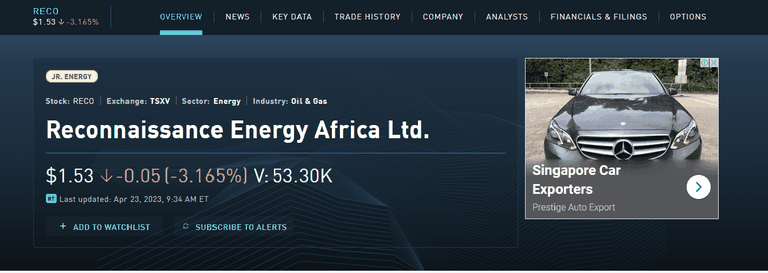
The climate impact of the U.S. Gulf of Mexico’s oil and gas production could be higher than government inventories indicate.
ReconAfrica hunt for oil and gas threatens vital waterways home to the world’s largest elephant population and endangered wildlife
A Canadian oil and gas company, Reconnaissance Energy Africa (ReconAfrica) has been granted a controversial licenses by the Namibian and Botswanan government to conduct exploration activities in a vast 21.243 kilometres (13.200 square miles) to confirm the presence of hydrocarbon resources on the Kavango-Zambezi Transfrontier Conservation Area. Currently, the firm has concentrated its exploration in northeastern Namibia, upstream of the Okavango Delta, a UN-recognized World Heritage. So far, all its attempt has failed to indicate the presence of commercially extractable oil. And there is worse, the firm stock price has plunged coupled by lawsuits and a cash shortage could force the embattled firm to halt operations.
But campaigners and conservationists fear the proposed oilfield stretching across Namibia and Botswana would devastate regional ecosystems and wildlife as well as local communities.
According to Mr. Daniel Jarvie, a geochemist consultant at ReaconAfrica said, “drilling in the Kavango Basin is a no-brainer. Given the nature of this basin and the tremendous thickness, it will be productive, and I’m expecting high-quality oil. Africa is the final frontier for oil discoveries because it’s so vastly under-explored and we could even be looking at the last major onshore oil discovery on Earth.
But experts believes that the hunt for oil and gas threatens vital waterways in Namibia and the Okavango Delta’s arid savannas, home to the world’s largest elephant population and vast numbers of endangered wildlife. They said that, the exploration licence that falls within the protected area, threatens the rich the biodiversity of the Okavango River basin; a crucial water source for over a million people.
The Namibian government has defended the exploration activities, without evidence, they claimed that the proposed exploration activities will not cause any negative impacts to the Okavango ecosystem as they are not connected to the proposed drilling locations. Meanwhile, Mr. Timoteus Mufeti, Namibia’s environmental commissioner, recently raised controversy after he approved ReconAfrica’s request to drill until June 2025 in the wildlife reserve. However, the commissioners’ actions prompted four community committees and forestry associations from the Kavango regions to file an official appeal to Mr. Pohamba Shifeta, Namibia’s minister of the environment and tourism, asking him to review or rescind Mr. Mufeti’s decision to grant an extension for ReconAfrica to continue its exploratory drilling.
Unfortunately, Mr. Shifeta ignored the group’s official appeal. Later, the group filed an urgent court action in Namibia’s High Court in an attempt to compel him to respond to their request. Shockingly, the plentiful request was swiftly dismissed with heft legal fees.
“The Minister of environment, forestry and tourism Pohamba Shifeta must immediately act on the appeal from the Kavango communities to review the granting of ReconAfrica’s Environmental Clearance Certificate, or provide a clear Record of decision (ROD) as to why he will not do so.” Said Rinaani Musutua from the Economic and Social Justice Trust.
According to the new the latest satellite images captured by SkyTruth revealed that by December 2022, ReconAfrica constructed an illegal road construction inside Kapinga Kamwalye Conservancy. Namibian conservancies are legally protected areas managed and used by local communities.
But conservationists says the action of firm violated the company’s own legally binding management plan, which says roads must avoid sensitive areas. “We were not informed and permission was never granted and it worries us deeply.” said Thomas Muronga, Kapinga Kamwalye’s chairperson from October 2019 to February 2023. According to Namibian law, anyone who wants to build a road inside a conservancy must get written approval from its management committee, but ReconAfrica’s roadwork was done without permission.
Meanwhile, National Geographic reports that, ReconAfrica has been a subject of a whistleblower complaint filed with the U.S. Securities and Exchange Commission (SEC). The filed complaint alleges the firm falsely misled investors by misrepresenting its work on the project, in order to drive up its stock price. The complaint cites more than 150 instances of misleading statements by ReconAfrica, and claims the company is violating US securities laws by promoting revenue projections to investors to raise cash for its falling project.
“Based on activities such as fracking for which it has not secured permission or permits from the local authorities in the respective countries. In September 2021, civil society groups submitted a request to the Canadian TSX Venture Exchange to investigate potential misrepresentations in the disclosures and public communications of ReconAfrica.” Highlight the filed complaint.
The ReconAfrica has been accused of offering jobs to buy silence. Recently, Mr. Max Muyemburukoa Chairperson of both Kavango East and West Regional Conservancy and Community Forest Association and chairman of Muduva Nyangana Conservancy, operating within ReconAfricaʼs license areas and also a fierce critic of ReaconAfrica disclosed that the company offered him a job to monitor wildlife on behalf of ReconAfrica.
To Mr. Muyemburukoa, he interpreted this offer as bribery and an attempt to be silenced due to large criticism ReconAfrica is facing, because of the company’s degradation of the environment and the illegality of its activities. He decline the offer.
Presumably, we need need to stop ReconAfrica’s project for the sake of the climate, biodiversity, water, and the livelihoods of the local people.
Siamo anche su WhatsApp. Segui il canale ufficiale LifeGate per restare aggiornata, aggiornato sulle ultime notizie e sulle nostre attività.
![]()
Quest'opera è distribuita con Licenza Creative Commons Attribuzione - Non commerciale - Non opere derivate 4.0 Internazionale.
The climate impact of the U.S. Gulf of Mexico’s oil and gas production could be higher than government inventories indicate.
Despite environmental warnings, the Tanzanian government is set to build a dam in the heart of the Selous Game Reserve, a UNESCO World Heritage site.
The cargo ship that ran aground off the coast of Mauritius on 25 July, causing incalculable damage, has split in two and its captain has been arrested.
Researchers from the IFM at Deakin University in Victoria, Australia have tested a novel method for removing silicon from used solar panels.
The Congolese government is allowing energy firms to bid for access to its vast oil and gas reserves, risking terrible ecological and climate effects.
The US government has approved ConocoPhillips’s controversial Willow Project to drill for oil in Alaska’s National Petroleum Reserve.
Environmental activists say the EACOP pipeline will damage Uganda’s iconic fragile ecosystem and the livelihoods of tens of thousands of people.
The EU has banned the sale of new petrol and diesel cars and vans from 2035. From then on, new cars and vans sold in the EU must run on other fuels.
Environmental activists have accused Eskom of emitting toxic chemicals that are costing thousands of lives and changing rainfall patterns.











